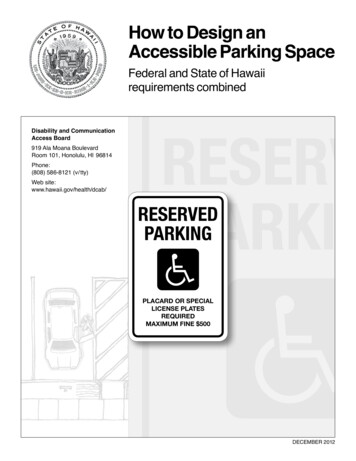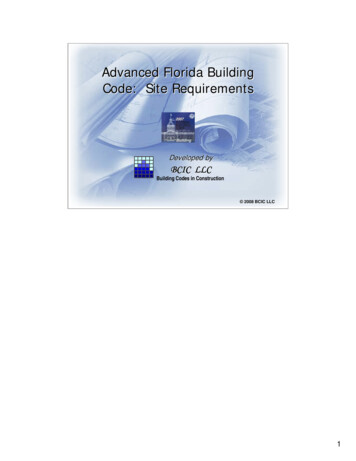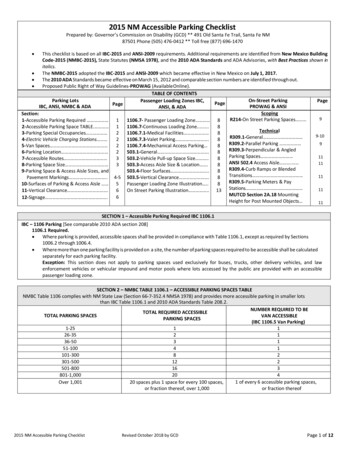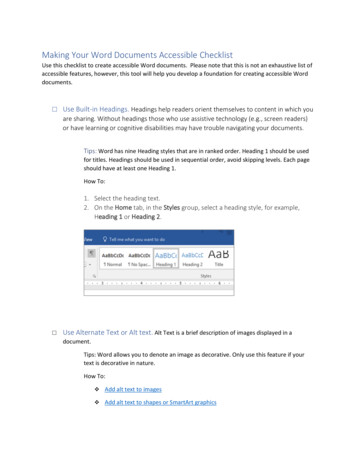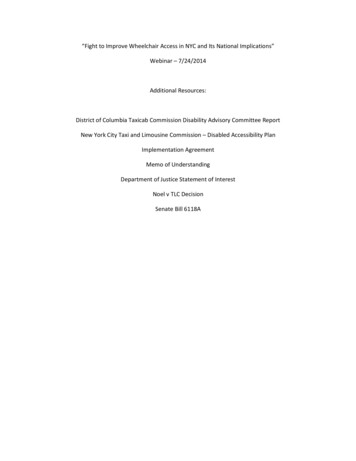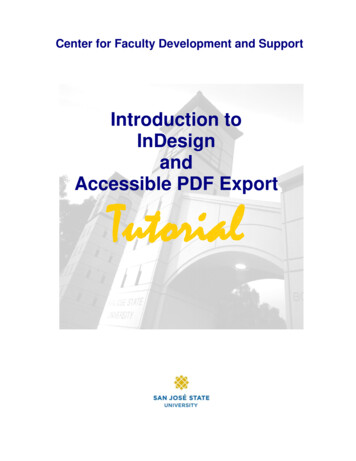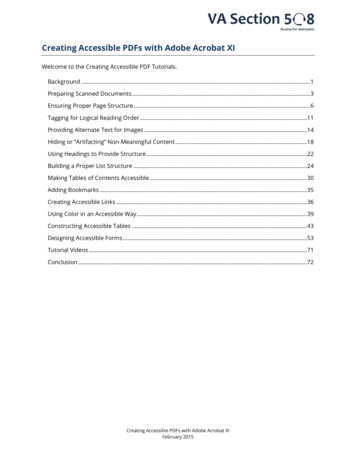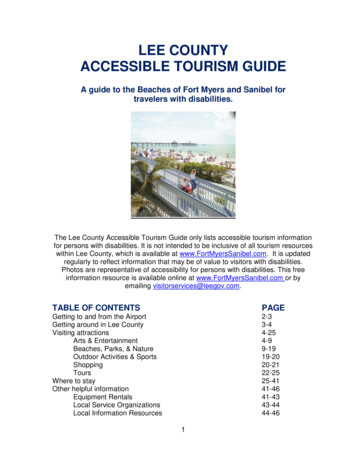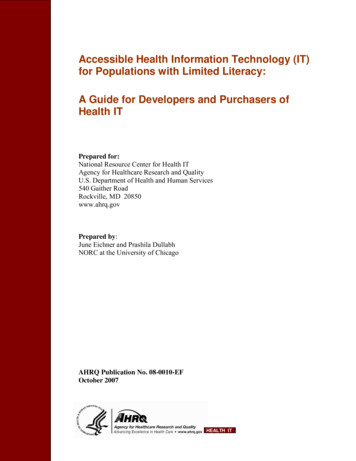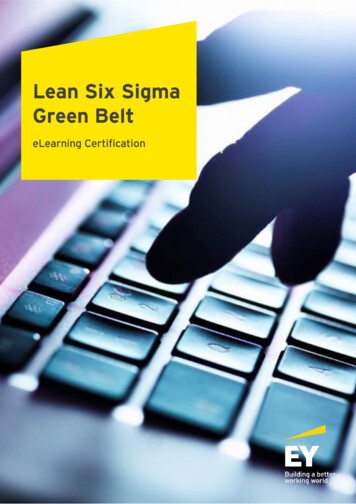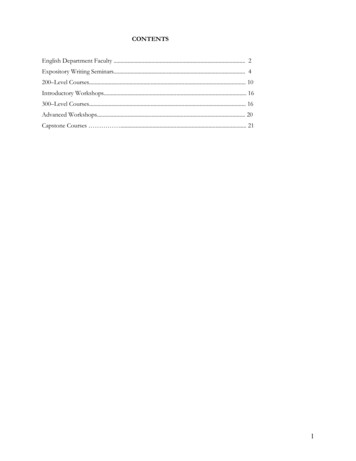
Transcription
CONTENTSEnglish Department Faculty . 2Expository Writing Seminars. 4200–Level Courses. 10Introductory Workshops. 16300–Level Courses. 16Advanced Workshops. 20Capstone Courses . 211
Please note: For your convenience, here is a list of the English Department faculty and their contactinformation for fall ’21. If office hours are not convenient, please make an appointment.Make sure you speak with your advisor well in advance of spring ’22 registration, whichbegins Nov. 2.INSTRUCTOROFFICE HOURSFall 2021EXT.OFFICEBaker, CalvinW 3:00-5:00 & by appt.5165PMH 315Benzon, PaulT 3:30-4:30, W 11:0-12:00, & by appt.5162PMH 311Bernard, AprilBy appt.8396PMH 319Th 1:30-3:00, F 11:00-1:005154PMH 313Boyers, PegBy appt.5186PMH 327Boyers, RobertBy appt.5156PMH 325Bozio, AndrewW 1:00-3:005158PMH 317W 2:00-4:30 via Zoom & by appt.5163PMH 316Diaby, BakaryM, F 11:00-12:00 & by appt.5166PMH 322Dunn, OliviaW, F 11:30-12:308493PMH 3325193PMH 336Black, Barbara, ChairCermatori, JosephFawcett, JenniferT/Th 11:00-1:00 on Zoom& by appt. (either in person or Zoom)Golden, CatherineTh 10:30-11:00, 12:30-1:30, & by appt on Zoom5164PMH 321Greaves, MargaretM 10-11:30 & by appt.5191PMH 309T, W 10:00-11:30 & by appt.5167PMH 324Hall, LindaM 10:30-12:00 & by appt.5182PMH 318Hrbek, GregOn leave- Email if necessary8398PMH 310Jorgensen, CaitlinW 10:15-12:15 & by appt.8393PMH 326Junkerman, NickW 2:00-4:00 via Zoom & by appt.5161PMH 306Marx, MichaelAssociate Chairhttps://calendly.com/mmarx office hoursIn person: T 2:15-3:00 & Th 2:15-4:15Zoom: M 4:00-6:00 & F 12:00-2:305173PMH 320McAdams, RuthMW 2:30-4:00 and by appt.5174PMH 331By appt.8112Star. 201By appt. on Zoom5169PMH 305Niles, ThadT 10:00-12:008114LIBR 442Parra, JamieSabbatical5172PMH 315Pashley, BrendaBy appt.8150Star. 101Soderlind, LoriW 3:30-5:305187PMH 333Sperry, Eileensee schedule on theSpring5153PMH 334Stokes, MasonW 11:00-12:00, Th 3:45-4:45, & by appt.5184PMH 308Suresh, ArchanaM 1:00-2:00, T 1:30-2:30, & by appt.5177PMH 320EWientzen, TimTh 12:00-1:00 & by appt.8397PMH 307Wolff, MeloraOn leave- Email if necessary5197PMH 323Greenspan, KateMelito, MarlaMintz, Susannah2
Note to Students:In this Prospectus, you will see some new designations for certain courses. If you entered Skidmore in the fallof 2020 or after, you will want to pay attention to the information in all caps bold that indicates which coursescount as your Early Period, Middle Period, and Late Period requirements for the English major. You’ll see thatthe course number also has the appropriate letter suffix (E, M, or L). You will need one of each to completethe English major. This is the new Literary History requirement.If you entered Skidmore prior to fall 2020, you will need two Early Period requirements for the English major.These are marked accordingly (with the information in all caps bold) and the appropriate letter suffix (E).3
EN 1034 creditsWRITING SEMINAR IDesigned to be accessible to a wide range of students, this course uses a variety of real-world topics and text types as students buildaudience-based writing skills for effective communication and persuasion. Students will learn reliable strategies to gain confidenceand develop an academic voice in a supportive community of writers, with special emphasis on making effective grammatical andstylistic choices. Along with writing skills, the course supports critical thinking, critical reading, and organizational skills thattranslate to other courses.Section 01WF 8:40-10:00A. SureshSection 02WF 10:10-11:30A. SureshEN 1054 creditsSee sections belowWRITING SEMINAR IIThe DepartmentIn this seminar, students will gain experience in writing analytical essays informed by critical reading and careful reasoning. Specialattention is given to developing ideas, writing from sources, organizing material, and revising drafts. The class will also focus ongrammar, style, and formal conventions of writing. Peer critique sessions and workshops give students a chance to respond to theirclassmates’ work. Weekly informal writing complements assignments of longer finished papers. This course fulfills the all-collegeFoundation Requirement in expository writing. Each section of 105 is focused on a particular topic or theme.EN 105 01TTh 9:40-11:00DIGITAL IDENTITYP. BenzonThe twenty-first-century world is a digital culture. The social transformations set in motion by our connectionto the web raise far-reaching questions for our identity. How is the rise of digital culture redefining how weunderstand ourselves as individuals and as social beings? Who do we become when we’re constantly connectedto family, friends, and strangers across global space and time? What roles do images, data, and devices play inthe construction of our identities? What does it mean to live, work, play, love, and die online?In this course, we will explore these and other questions of digital identity as a way of developing critical writingand reading skills. Through analysis of a range of texts including fiction, film, photographic images, criticalwritings, and the everyday objects of the digital world, we’ll explore how digital technology plays a role inreshaping issues such as personality, privacy, gender, race, sexuality, power, and anonymity. Through anintensive process of drafting, workshopping, and revising, we’ll write critically and reflectively about our ownconstantly shifting positions and identities within the increasingly complex network of the web. Our ultimategoal will be to become stronger critical readers and writers as well as sharper, more engaged participants in thedigital culture around us.EN 105 02MWF 8:00-8:55FOOD FIGHTSC. JorgensenEveryone has a favorite food, and most have at least one food they won’t touch. But food is about more thantaste: it references memory, community, language, and culture. Sometimes that yields nostalgia; sometimes itproduces conflict. In this class, we will examine food writing on a number of topics: What pleasure lies in foodmemory? How does food intersect with economics, language, social justice, history, and race? Who has theright to claim—and to profit from—the food of a particular culture? In the end, what should we eat—both forour own sake and for the sake of the planet?Our writing projects will range from nonfiction narrative to researched argument; our readings will range frommemoir to persuasive text. You will develop your ability to analyze food writing, and you will learn how to enterinto the debate using the tools of rhetoric. These tools include various types of appeals as well as strategies for4
invention (coming up with something to say), arrangement (organizing your thoughts), and style (writing clear,graceful, persuasive prose). There will be frequent formal and informal writing, peer review, revision exercises,and small-group workshopping.EN 105 03MWF 10:10-11:05UNDER THE INFLUENCET. NilesEN 105 08MWF 11:15-12:10UNDER THE INFLUENCET. NilesArgument seems inescapable. As a central cultural practice of Western higher education, adherence to its ritualscan determine the success of an essay or presentation, which is perhaps enough to motivate its study. But morecompelling reasons for examination may come from the arguments that surround us in newspapers,advertisements, and everyday political discourse. Certainly, responsible citizens and consumers ought tocritically examine attempts to influence their lives, gain their money, or win their allegiance. The skills we learnwill help us understand the structure and strategy of arguments. Hopefully, what we learn will be relevant toour lives inside and outside of the academic sphere. In this writing course, we will explore some fundamentalprinciples of argument (using real-life examples when possible) and examine rhetorical choices in a variety ofsituations. We will also explore how professionals confront various psychological, social, linguistic, and ethicalissues related to persuasion. All this will prepare us to create a final project designed to enhance public discourseand decision-making—i.e., a useful text designed for a real-world audience.EN 105 04WF 8:40-10:00WRITING AS RADICAL EMPATHYO. DunnEN 105 05WF 10:10-11:30WRITING AS RADICAL EMPATHYO. Dunn“Language is far from being a closed, self-contained system, and words are deeply intertwined with our waysof engaging with the world. Language in this sense is more like an interface rather than a firewall, an array ofdevices that connects us to the things that matter to us,” says the scholar Rita Felski. Good writing can give thereader an emotional experience, a chance to interact with another person’s mind and heart. But how does it dothis? How does language convey emotion? How does a writer make us see what they see, feel what they feel?In this class, we’ll move outside of our comfort zone—away from simply reading works we might enjoy becausethey are “relatable.” We’ll explore what boundaries writing can cross. We’ll discuss how writing can createchange in the world. We’ll look at work from writers and artists who actively work to make us see things theirway, from poets to activists to visual artists. We’ll pay special attention to how each artist crafts their work;using these same tools, you’ll create powerful writing of your own. By the end of the semester, after draftingand revision, you’ll have a portfolio of polished writing.EN 105 06MWF 11:15-12:10THE WITCHJ. FawcettHag, crone, prostitute, midwife, monster. Other. Beyond the pointy hat and the broomstick, what is a witch?Witches have been around for centuries. Today they may range from kitschy Halloween staples to a fearsomesymbol of power, but some things haven’t changed: at the root is an iconic female figure who challengesmisogyny. This course will explore the place of witches in history, literature, and Western culture, focusing onhow they connect to female bodies, deformity, and feminism. Non-conformity used to get you burned at thestake: what are the costs today? The goal of the class is to develop a rigorous process for creating written workthat is clear, thought-provoking, and elegant. Coursework includes three short papers and three polished essaysdeveloped through multiple drafts, peer critique, and individual conferences.EN 105 07MW 2:30-3:50ARGUMENTS FROM THE STAGEJ. Fawcett“Theatre remains any society’s sharpest way to hold a live debate with itself. If it doesn’t challenge, provoke or5
illuminate, it is not fulfilling its function” (Peter Hall, The Necessary Theatre). In centuries past, when the majorityof the population was illiterate, the theatre was more than entertainment; it was a political tool. Today, we haveunlimited access to arguments, polemics, and opinions delivered via a sound bite; however, despite intensecompetition from social and mainstream media, theatre remains a powerful means for provoking change. Thiswriting seminar will examine a range of contemporary plays to understand how the arguments are constructedand what role theatre plays in current public discourse. The goal of the class is to develop a rigorous processfor creating written work that is clear, thought-provoking, and elegant. Coursework includes three short papersand three polished essays developed through multiple drafts, peer critique, and individual conferences.EN 105 09TTh 3:40-5:00HAPPYM. MelitoFrom the Declaration of Independence to the #100daysofhappiness project, one could argue that Americansare obsessed with the pursuit of happiness. But what are we really seeking? What lengths are we willing to goto find happiness? How do factors like income, education, relationship status, and technology inform ourperceptions? Can we bottle happiness? Buy happiness? Be coached into happiness? What does it mean to betruly happy? And what happens when you are not? In this writing seminar, we will examine these questions andour own cultural and personal biases through reading, writing, and discussion. We will examine texts fromphilosophers, psychologists, film-makers, and essayists as we consider the question of what it means to behappy. Students will prepare weekly responses, formal essays, and a research project, in addition to participatingin peer workshops and teacher conferences.EN 105 011MW 4:00-5:20WRITING THROUGH THE PANDEMICM. MarxBy now, it is a truism that the COVID-19 pandemic has indelibly shaped our lives, much as 9-11 impacted thelives of the generation twenty years ago. After over a year and a half, we remain in the midst of the COVID-19pandemic: from sheltering in place, Zoom, and remote learning, to masking, social distancing, breakthroughinfections, and mRNA. Our lives have changed, individually and as a society. In “Writing Through thePandemic,” we will use writing to understand and preserve some of those deepest, most personal changes andto analyze how we have shaped the pandemic, ultimately to make meaning of this defining experience. Inaddition to personal narratives, we will write formal essays and informal exercises to analyze the lexicon thathas emerged from the pandemic; examine the equities, inequities, and priorities of our society that the pandemichas brought to the foreground; and participate in the central arguments emerging from the pandemic. Overthe semester, we will write multi-drafted formal papers, use social media programs to share and develop ideas,and revise, revise, revise.EN 105 012MW 2:30-3:50THE COLOR OF JUSTICEA. BozioWhy is racism such a durable force in the United States? Couldn’t we end it by simply refusing to see differencesbetween people? In this course, we’ll consider the limits of “colorblindness” by studying some of the structuresthat shape race in America, as well as their effects upon the lived experience of people of color. Reading worksby James Baldwin, Ta-Nehisi Coates, and Claudia Rankine alongside critical race theory, we’ll first studydifferent forms of racism and the way that race intersects with gender and sexuality. Turning to the history ofhousing segregation, we’ll then consider the consequences of government policy for what has been called “theracial wealth gap” and ask if reparations could offer an answer to these injustices. Finally, we will turn to massincarceration and its role in perpetuating racial inequality. Through this course, students will learn to becomemore critical readers and thinkers, to undertake different kinds of research in pursuit of answers to difficultquestions, and to craft strong and compelling arguments.EN 105 13TTh 12:40-2:00WRITING ON DEMANDL. HallWhen the essayist Joan Didion was in her twenties, she wrote editorial copy for Vogue magazine on a wide range6
of subjects. In her forties, she noted that it is “easy to make light of this kind of ‘writing,’ [but] I do not makelight of it at all: it was at Vogue that I learned a kind of ease with words. a way of regarding words not as mirrorsof my own inadequacy but as tools, toys, weapons to be deployed strategically on a page.” Inspired byDidion’s on-the-job apprenticeship, this course will ask you to undertake the work of a professional copywriteror ghostwriter. What might you be asked to compose? The introduction to the documentary “extras” for atelevision series. The “Our Story” blurb for the website of a local restaurant. A capsule biography for a mayoralcandidate. A C.E.O.’s response to a request from Forbes: “Tell us about the biggest mistake you ever made as aleader.” The instructor will furnish you with material; with her guidance, you will shape it into publishable or,as the case may be, presentable prose. Expect frequent short assignments, most of them graded.EN 105 14TTh 2:10-3:30WRITING ABOUT MUSICM. Stokes“If you’re lucky, at the right time you come across music that is not only great, or interesting, orincredible, or fun, but actually sustaining. Through some elusive but tangible process, a piece ofmusic cuts through all defenses and makes sense of every fear and desire you bring to it. As it doesso, it exposes all you’ve held back, and then makes sense of that, too.”—Greil Marcus, In the Fascist Bathroom: Punk in Pop Music, 1977–1992In this course, we’ll try to find a language for that “elusive but tangible process” Marcus references.Experimenting with various forms—the review, the personal essay, cultural criticism, scholarly analysis—we’llwrite about music and what it does to us. We’ll do so as a community of writers, sharing work-in-processthrough regular workshops. Along the way, we’ll also share our music—the songs and artists that sustain us.EN 105 15WF 8:40-10:00WHAT’S IN IT FOR ME?B. Pashley“The best way to find yourself is to lose yourself in the service of others.” These words from Gandhi inspirethis writing seminar where we will examine what it means to be a part of a community. What types ofcommunities exist? Are there inherent responsibilities that people have as members of communities? And whotruly benefits from volunteerism and community service? Participating in a volunteer experience that resonateswith you will be the foundation for much of your writing in our class. Using this experience and coursereadings, you will create several original compositions using a formal writing process. Additionally, you willproduce informal writing, criticize each other’s writings, debate controversial topics, and improve yourpresentation skills, all while participating in something larger than yourself: a community of writers. At theconclusion of this class, you can expect a more sophisticated sense of yourself as a writer and a more refinedsense of self and community. You’ll really understand what’s in it for you.EN 105 16TTh 12:40-2:00MEMOIR FROM THE MARGINSL. SoderlindEN 105 17TTh 2:10-3:30MEMOIR FROM THE MARGINSL. SoderlindWe begin to empathize with people who are different from ourselves by hearing their stories.A well-crafted memoir illuminates worlds we might otherwise have misunderstood, both in contemporary lifeand in history. Yet people on the margins of dominant culture often lack the powerful combination ofopportunity, language skills, access to technology, support from mainstream media, and financial stabilityneeded to tell their own stories and distribute them broadly. In this writing seminar, we will consider the valueof memoir as a means to broaden our understanding of human experience. We will define what makes apersonal narrative “authentic” and consider just exactly whose stories are most likely to be “told” throughcontemporary media—or, more to our point, whose stories are left out: Native Americans, African Americans,and LGBTQ individuals; political prisoners, coal field workers, homeless people; recovering addicts, survivorsof illness, natives of distant lands? Writing assignments will include research and will focus on comparisons ofconflicting narratives, consideration of evidence that expands on written accounts, and the telling of eachstudent’s own story in a narrative voice.7
EN 105 18TTh 3:40-5:00BACKSTORIES: DISCOVERING WHYTHINGS ARE AS THEY AREL. SoderlindHow do you suppose your lights come on so reliably? It starts long before the switch is flipped. Many of thesimple functions and customs of our world are greatly more complicated than we realize. This course inexpository writing invites students to think about major structures in our lives that we take as givens, and tounravel their webbed backstories. The same tangle of environmental, political, social, and economiccontroversies that precedes power to bulb underlies many critical functions we rely on in the physical world, andalso precedes many “norms” in our culture. The two-day weekend workers enjoy today, for example, was notpreordained; it exists because the labor movement fought for it. By examining cause-effect chains and criticalchoices made along the way, we’ll learn more about how the world works—and sometimes doesn’t. Studentswill develop arguments for ways to improve these systems and, because a curious mind is essential to goodwriting, will foster their own interest in discovering how all kinds of things work.EN 105 19MW 4:00-5:20LAST WORDSE. SperryEN 105 20MW 6:30-7:50LAST WORDSE. SperryFor as long as humans have been writing, we’ve been trying to out-write death. The written word has been heldup by artists and authors as something that can outlast almost anything, especially our fragile bodies. Thissemester, we’ll first explore what it means to be mortal. How have others theorized what it means to die? Whatdo you think defines mortality? Second, how can writing respond to our mortality? Is it a gateway to immortality,or does writing also eventually fade away? Finally, we’ll think about the future of immortality technologies—social media, bionics, and other augmentations that call into question what death might look like in the future.Throughout all this, we’ll think about the work of writing; we’ll develop careful analytical skills, work onpractices like planning, drafting, and revising, and develop our own individual voices in conversation with theworks we encounter.EN 105H4 creditsWRITING SEMINAR II:HONORS SECTIONSThe DepartmentThe honors sections of EN 105 offer highly motivated students with strong verbal skills the opportunity to refine their ability toanalyze sophisticated ideas, to hone their rhetorical strategies, and to develop cogent arguments. Toward these goals, students writeand revise essays drawing upon a variety of challenging readings and critique each other’s work for depth and complexity of thought,logic of supporting evidence, and subtleties of style. Students must have an EW placement of EN105H to enroll.EN 105H 01TTh 9:40-11:00WRITING ON DEMANDL. HallWhen the essayist Joan Didion was in her twenties, she wrote editorial copy for Vogue magazine on a wide rangeof subjects. In her forties, she noted that it is “easy to make light of this kind of ‘writing,’ [but] I do not makelight of it at all: it was at Vogue that I learned a kind of ease with words. a way of regarding words not as mirrorsof my own inadequacy but as tools, toys, weapons to be deployed strategically on a page.” Inspired byDidion’s on-the-job apprenticeship, this course will ask you to undertake the work of a professional copywriteror ghostwriter. What might you be asked to compose? The introduction to the documentary “extras” for atelevision series. The “Our Story” blurb for the website of a local restaurant. A capsule biography for a mayoralcandidate. A C.E.O.’s response to a request from Forbes: “Tell us about the biggest mistake you ever made as aleader.” The instructor will furnish you with material; with her guidance, you will shape it into publishable or,as the case may be, presentable prose. Expect frequent short assignments, most of them graded.8
EN 105H 02MWF 1:25-2:20WORK!R. McAdamsWhat do you want to be when you grow up? Do your parents want you to think harder about how you will GetA Job after graduation? What even is an internship and why doesn’t it come with a paycheck? In this writingseminar, we will analyze theories and representations of work. We will read and write about debates over whatdoes and does not count as work, the idea of work-life balance in a post-COVID economy, the rise and fall(and rise again) of organized labor, “gig” work, and the death of the full-time job. We will pay particularattention to how constructions of race, gender, class, sexuality, and ability intersect with ideas about work andworkplaces. Above all, we will write and talk about writing—in essays, short assignments, and peer reviewsessions—and we will explore how writing can itself be a form of work and a way of understanding what workis.EN 1104 creditsINTRODUCTION TO LITERARY STUDIESThe DepartmentThis course introduces students to the practice of literary studies, with a particular emphasis on the skills involved in close reading.The course aims to foster a way of thinking critically and with sophistication about language, texts, and literary production. Wewill ask such questions as how and why we read, what it means to read as students of literature, what writing can teach us aboutreading, and what reading can teach us about writing. The goal overall is to make the words on the page thrillingly rich andcomplicated, while also recognizing the ways in which those words have been informed by their social, political, aesthetic, psychological,and religious contexts. This course is writing intensive and will include some attention to critical perspective and appropriate researchskills. (Fulfills the all-college Foundation Requirement in expository writing; prospective English majors are encouraged to takeEN 110 prior to enrolling in 200-level courses.)EN 110 01TTh 3:40-5:00LITERATURE AND GRIEFJ. CermatoriLoss, sorrow, and the challenges of living with them have unfortunately become pervasive today, part ofeveryday life in the modern world. This course seeks to ask: how has literature—in its various historical contextsand forms—responded to the enduring problem of grief? How does mourning take shape in literary works,and how might literature help us navigate the grievousness of our present moment, marked as it is by publichealth crises, vanishing political horizons, and planetary climate change? Together, we will encounter worksfrom a range of genres and time periods (poetry, plays, prose fiction, essays) that take up the pain of loss andwhat Elizabeth Bishop once called “the art of losing.” We will consider the psychological and political meaningsof grief in literature, along with the way mournfulness, healing, and survival have been intertwined acrossgenerations of literary history. Readings will include works by Emily Dickinson, Gwendolyn Brooks, WilliamShakespeare, Caryl Churchill, Herman Melville, Kazuo Ishiguro, and others.EN 110 02MWF 9:05-10:00NATURE AND ITS LIMITSB. DiabyThis course will look at the myriad ways in which “nature” is constructed, represented, and complicated throughliterature and literary history. What terms like “nature” and “natural” meant differs drastically from the Medievalperiod (where Natura was situated between the divine and human) to the present (where nature is often thoughtof in terms of resources or systems). Moreover, how we have figured the natural world influences how weethically or ontologically relate to the environment and to each other, necessitating that we look at theentanglements of nature and identity. Over the course of the semester, we will read Medieval texts, early moderndrama, Romantic poetry, ecofeminist thought, and contemporary works as well. Students will write three shortessays.EN 110 03TTh 11:10-12:30TEMPTATIONC. GoldenA motif dating from the Bible and extending across centuries and genres of British and American literature.Our section of EN 110 will begin with Jane Austen’s Regency novel Pride and Prejudice (1813) with Mr. Darcy’srefusal to dance with Elizabeth Bennet, who is “‘tolerable, but not handsome enough to tempt me’” (emphasis9
added). We will move back in time to the temptation scene in the Garden of Eden and onward to ChristopherMarlowe’s play Dr. Faustus (1616) where we witness the temptation of the soul for unlimited knowledge.William Blake’s Songs of Experience (1794) and Christina Rossetti’s The Goblin Market (1862) present us withpoems about temptation and succumbing to forbidden fruit. Charlotte Perkins Gilman’s groundbreakingfeminist short story “The Yellow Wall-Paper” (1892) approaches temptation differently—the nameless narratorattempts to read and decipher the patterns on the ubiquitous wallpaper.Analyzing these tempting texts across genres and reading scholarly introductions, literary criticism, andendnotes, students will write four essays and practice textual annotation through the Collaborative Organizationfor Virtual Education (COVE) to develop a repertoire of critical methodologies. Underlying our course arefoundational questions to literary studies: What constitutes textual evidence? How is a text informed by itssocial, political, aesthetic, psychological, and religious contexts? In what ways does literary criticism influenceour reading of a text? Since this course is writing intensive, we will give attention to critical thinking, the writingprocess, revision, grammar, and research skills to help you develop your voice as a writer.EN 110 04TTh 12:40-2:00SUPERNATURALISMSN. JunkermanThis course will introduce you to the study of literature through representations of the supernatural. We willfocus on how literary texts help us to understand extraordinary events, and how literary forms shape thepossible meanings of those events. We will also consider how supernatural phenomena have been describedacross varying literary genres like poetry, drama, and fiction. Writers on the syllabus may include James Baldwin,Shirley Jackson, Carmen Maria Machado, Kelly Link, and Edgar Allan Poe. Throughout the semester, we willpractice the craft of writing about literature at the college level. Students will write several essays, as well ascomplete various shorter assignments.GN 151A 01W 5:00-6:001 creditCOLLOQUIUM ON LITERARY RESEARCH METHODSJ. CermatoriIn this course, faculty from the Skidmore English department will lead weekly discussions on their recentresearch projects and on the methods that are ce
This course fulfills the all-college Foundation Requirement in expository writing. Each section of 105 is focused on a particular topic or theme. EN 105 01 DIGITAL IDENTITY P. Benzon ; TTh 9:40-11:00 . The twenty-first-century world is a digital culture. The social transformations set in motion by our connection
